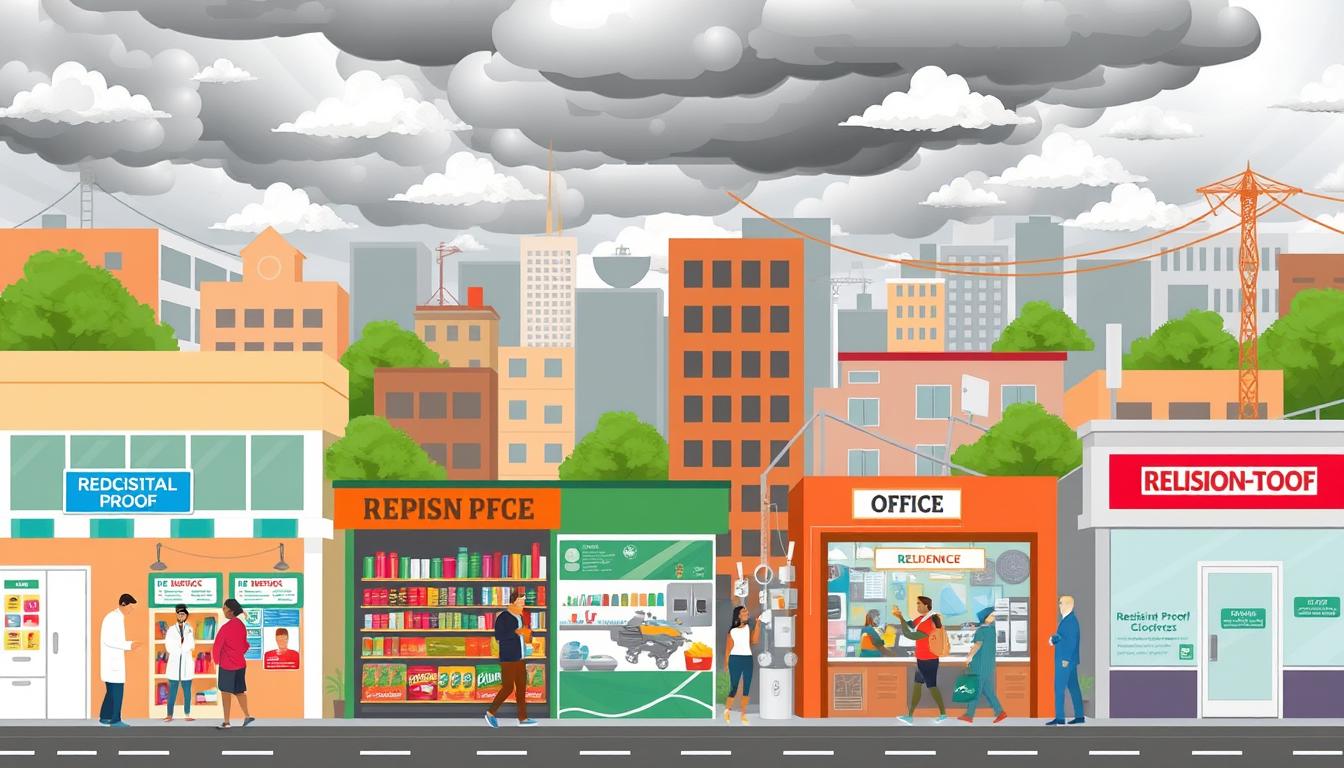“As an Amazon Associate I earn from qualifying purchases.”
In early 2020, fear and uncertainty spread as the Great Lockdown started. This led to a tough recession. It was tough watching businesses close and investments drop. However, some industries found a way to grow and succeed despite these hard times.
Within the S&P 500, just 32 companies had positive returns in early 2020. This shows that only a few industries can do well during tough economic times. Companies like Regeneron Pharmaceuticals Inc. stood out with a 30.04% return. Sectors like information technology and consumer staples were also strong. This highlights the need to find businesses that can adapt and meet constant demand.
Key Takeaways
- Despite the severe economic impacts of the Great Lockdown, 32 companies in the S&P 500 posted positive returns in the first quarter of 2020.
- Regeneron Pharmaceuticals Inc. led with a 30.04% return, followed by Citrix Systems Inc. and NortonLifeLock Inc.
- Information technology sector was most represented in the top performing stocks.
- Consumer staples demonstrated resilience with companies like Clorox, Kroger, and General Mills posting decent returns.
- Understanding recession-proof sectors can help identify profitable industries in a recession and the best businesses to start in a recession.
Understanding Recession-Proof Industries
During tough economic times, some industries remain strong. They move forward while others struggle. Knowing which businesses are recession-proof helps investors and entrepreneurs make smart choices.
What is a Recession-Proof Business?
A business that holds up during economic troubles is called recession-proof. Such businesses often have flexible pricing strategies, low costs, or provide essential services. For example, healthcare, utilities, and everyday goods always have a steady demand, no matter the economy’s state.
Traits of Recession-Resistant Sectors
Sectors that resist recessions share key features. They can adapt to changes, have a steady demand, and are careful with money. They keep cash reserves and avoid spending too much. This approach keeps industries like healthcare thriving, even when money is tight for everyone else.
In 2008, some companies saw their value go up, not down. AutoZone, Inc. (AZO) shares went up by more than 25%. Waste Management Inc (WM) also did well, with shares rising nearly 17%. These success stories highlight the power of picking strong sectors during economic downturns.
Why Some Businesses Thrive in Economic Downturns
Some businesses do well when the economy doesn’t. They offer either essential services or affordable luxuries. This is known as the “lipstick effect.” People still buy small treats, like beauty products, even when they cut back on other expenses. Plus, industries with subscriptions or services that save money, like e-learning, can grow.
Real estate, financial services, and auto repairs also usually do well. These businesses meet ongoing needs that don’t go away when times get tough. For instance, the repair and home improvement industry is booming, valued at $457 billion annually. You can find more about these business opportunities during economic downturns online.
Healthcare: A Resilient Sector
The healthcare sector stands strong, even in tough economic times. This strength comes from our need for medical services and products. They don’t lose value, making healthcare a solid foundation during hard times.
Core Characteristics of the Healthcare Industry
What makes healthcare strong? It’s got growing jobs and is seen as essential. In 2018, about 12% of U.S. jobs were in healthcare. From 2006 to 2016, healthcare jobs grew seven times faster than other fields.
Healthcare’s toughness is also due to strict licensing, insurance covering costs, and its value to society. These factors keep the sector strong, even when money is tight.
Demand for Pharmaceuticals and Medical Services
No matter the economy, people always need medicine and medical care. In 2017, Nursing Care, Home Health Services, Doctor Offices, and Hospitals made up 63% of healthcare jobs.
The cost of hospital supplies and drugs keeps going up, proving healthcare services are always needed. Between 2019 and 2022, hospital supply costs per patient jumped 18.5%. Drug costs went up 19.7%, and labor costs rose by 20.8%.
Impact of Aging Populations on Healthcare
More older people mean more demand for healthcare. Advances in medical tech and new healthcare jobs after the Affordable Care Act show how the sector can grow.
With aging comes more chronic diseases, keeping healthcare essential. More than half of U.S. workers had high-deductible health plans in 2021, a big jump from 2013.
| Factor | Growth Percentage | Time Period |
|---|---|---|
| Healthcare Employment | 7 times faster | 2006-2016 |
| Supply Expenses per Patient | +18.5% | 2019-2022 |
| Drug Expenses per Patient | +19.7% | 2019-2022 |
| Labor Costs | +20.8% | 2019-2022 |
| Contract Labor Expenses | +257.9% | 2019-2022 |
In the end, healthcare’s vital role and constant need for services and drugs highlight its lasting robustness. With growing older populations and medical advancements, healthcare’s future looks steady and strong.
Information Technology: Innovating Through Economic Challenges
In times of economic uncertainty, the information technology (IT) sector shines. It shows great resilience and adaptability. We’ll look at how the industry is handling digital transformation, cybersecurity trends, and remote work technology. Market data shows IT’s crucial role in driving innovation and maintaining growth during economic downturns.
Digital Transformation During Recessions
Recessions often lead to big digital changes. For example, the Great Recession in 2008 saw the start of 4G LTE mobile broadband when only a third of US homes had a smartphone. Now, with the threat of a recession in 2023, we’re looking at advances in 5G and other tech. Companies focusing on new technologies during tough times tend to come out ahead.
Investing in digital transformation helps companies survive. More importantly, it sets the stage for long-term success.
Cybersecurity and Remote Work Trends
The COVID-19 pandemic has made remote work technology essential. It showed us how critical strong cybersecurity is. Executives believe COVID-19 will change how businesses operate for years to come. There’s a bigger push for cybersecurity to keep remote work safe. Also, tech job ads are now more focused on new tech like artificial intelligence.
Even as companies look to save money, they’re keeping their cybersecurity investments. This helps them stay competitive and secure.
Key IT Services in High Demand
Some IT services are more in demand during economic downturns. Companies tend to focus R&D on high-margin areas. They prioritize expanding their current markets over exploring new ones. Cloud computing, artificial intelligence, and data analytics are highly sought after.
Past crises show us that companies that keep innovating do better by over 30%. Using IT resilience, firms can overcome economic challenges and keep growing.
| Key Indicators | Statistics |
|---|---|
| Introduction of 4G LTE Mobile Broadband (2008) | 30% of US households owned smartphones |
| Focus on Emerging Technologies | 30% of tech job postings |
| Executives Predict Long-term Business Changes | 90% |
| Executives Confident in Future Preparedness | Fewer than 30% |
| Shift to Digital Engagement (B2B Sector) | 96% of businesses |
| Post-crisis Performance of Innovating Firms | Outperformed market by over 30% |
Consumer Staples: Necessities Remain Steady
Consumer staples are key for daily living, covering items like groceries, household cleaners, candy, and toilet paper. They resist economic lows because essentials are always needed. This keeps the consumer staples stable.
Essential Goods and Inelastic Demand
In tough economic times, essentials like food and personal care items stay important. People keep buying what they need, showing how strong this sector can be.
Performance of Major Consumer Staples Companies
Big names like Unilever, Procter & Gamble, Coca-Cola, and Kroger show the sector’s power. They keep offering must-have items, reinforcing consumer staples stability.
Looking closer at their success, we see more proof of this stability.
| Company | Product Range | Recession Performance |
|---|---|---|
| Unilever | Personal care, cleaning agents, food | Steady demand and growth |
| Procter & Gamble | Hygiene products, cleaning supplies | Consistent sales increases |
| Coca-Cola | Non-alcoholic beverages | Stable through economic cycles |
| Kroger | Grocery retail | Continued patronage during downturns |
| Costco Wholesale | Bulk groceries, household items | Increased membership and sales |
People stick to their buying habits because of the vital nature of these items. When saving money matters, they often shop at places like Costco Wholesale for better deals. This shows how essential goods keep their demand, even in tough times.
Profitable Industries in a Recession
In hard economic times, some sectors still do well, offering profitable spots during a downturn. These businesses do well because they offer necessary services. People keep needing them even when they need to spend less.
Financial Services: Advisors and Accountants
When there’s a recession, more people and small businesses get help from financial advisors and accountants. They need guidance with taxes and money problems. Becoming a financial advisor or accountant can be profitable during these times. For tips on doing well in tough times, click here.
Auto Repair and Maintenance
Auto repair shops stand strong during economic lows. As fewer people buy new cars, they choose to fix and maintain their current ones instead. This means auto repair businesses often see more customers and work.
Property Management and Real Estate
Property management is key in real estate during a recession. Even if fewer homes are sold, people still need places to live. Property managers help keep rental properties filled and in good shape. With everyone needing a home, this area becomes a wise choice for business during downturns.
Cleaning Services and Sanitization
There’s a bigger call for cleaning and sanitizing when money is tight, especially with more health worries. Both companies and people at home want professional cleaning. This need grows in places like hospitals. Starting a cleaning service could be a smart move to keep earning during a slump.
Real Estate: Dynamic Opportunities Amidst Challenges
The real estate sector shines even in an economic downturn. It offers promising real estate recession opportunities. In the past 70 years, real estate values have usually gone up during recessions. The constant need for housing keeps the demand for homes strong. This makes the sector very resilient.
In uncertain economic times, dynamic real estate investing means taking advantage of lower interest rates and less competition. Buyers find better prices and favorable loan terms. However, they face stricter lending rules and selective sellers. Real estate is a more stable investment than stocks or mutual funds. It’s safer during tough times.

The National Bureau of Economic Research (NBER) uses several factors, like nonfarm payrolls, to judge recessions. These factors help investors spot the best times for economic downturn real estate trends. Recently, more people have moved away from cities. This has increased the value of homes in suburbs and in flexible housing markets, like in Colorado.
But, investors should watch out for rising interest rates and more layoffs. The Federal Reserve raised interest rates in 2022 to fight inflation. This made getting a mortgage harder. Those with good credit scores and big down payments are in a better position. Because of this, fewer people can buy homes, which might lower prices.
Real estate is good protection against inflation and is more stable than other investments. There are many investment choices, like rental properties, house flipping, and Real Estate Investment Trusts. REITs include data centers and telecommunications. Having good cash flow and stable income is key to using real estate recession opportunities well.
Government policies, like stimulus packages and tax breaks, can change the market during a recession. By keeping up with market changes and adapting strategies, real estate investors can see good returns. Homeowners can look into refinancing, renting out space, and keeping maintenance costs low to protect their investments.
| Aspect | Recession Impact | Opportunities |
|---|---|---|
| Housing Demand | Remains Steady | Lower competition, favorable pricing |
| Interest Rates | Reduced for Mortgages | Affordable financing options |
| REITs | Technological Innovation | Gains in data centers and telecommunications |
| Investment Stability | Higher than Stocks/Bonds | Reliable asset appreciation |
Communication Services: Keeping the World Connected
Even during tough economic times, communication services keep us all linked together. The rising need for internet services, along with the demand for strong telecommunication, shows how critical this sector is. As folks shift to working from home and living online, the need for dependable internet and telecom services grows.
Telecommunication and Internet Services
In hard economic times, telecommunication and internet services keep personal and work links alive. The industry’s quick response to a surge in internet demand shows its key role when connection is key. People spend about eight hours a day online, showing how much we rely on these services.
Over half of shoppers begin their buys with a Google search, proving the need for strong internet infrastructure.
Streaming and Entertainment
Streaming services have boomed, especially when the economy slows and people look for fun at home. Netflix has seen big gains, showing how much our habits for watching content have changed. This change isn’t just about wanting to relax. It also shows how telecom services support smooth streaming.
During downturns, it often takes seven tries before a lead turns into a customer. This makes keeping people engaged through streaming more important than ever. With the U.S. ad market down 7% in the second quarter of 2022, streaming offers a new way to keep audiences.
| Aspect | During Recession | Post-Recession |
|---|---|---|
| Internet Services Demand | High | Moderate |
| Telecommunication Resilience | Crucial | Essential |
| Streaming Services Growth | Accelerated | Steady |
Utility Services: Consistent Demand in All Economies
Utility services like water, gas, and electricity show utility services stability when the economy shifts. They always need customers, making them a solid choice for investment. They’re known as recession-proof utilities because they offer steady money flow and dividends. This is attractive to investors looking for safety during uncertain times.

Understanding utility services helps us see their economic role. Take PG&E Corporation, for example. In 2014, it made over $17 billion. This shows the non-stop need for essential services demand. Even in tough times, utilities are vital for homes and businesses alike.
Unlike some sectors, utility services are always needed, making them recession-proof utilities. The COVID-19 pandemic proved this. Utilities kept going strong, thanks to their critical role.
$table>
These stats show that recession-proof utilities barely feel the negative effects seen in other sectors. It highlights how crucial utility services are. They help keep utility services stability even when the economy dips.
Child Services: An Underrated Sector
The child services sector faces many challenges but stands strong. It shows how important it is in the industry. With parents working, the need for good childcare stays high. This need helps the baby product market grow.
Childcare Needs During Economic Slowdowns
When the economy goes down, childcare services still get used a lot. This is because working parents need these services. Visit here for more info. Even though about 16,000 providers closed between December 2019 and March 2021, the sector remains strong.
More than 70,000 programs might close without help. Yet, parents still look for dependable child care. This shows the industry’s strong ongoing demand.
Growth of the Global Baby Product Market
The global baby product market is growing. This growth is a sign of the strong childcare services industry. With more births and a focus on eco-friendly, high-quality products, the market is booming. Child care issues cause a big economic loss of $122 billion every year. This loss comes from lost earnings, less productivity, and lost revenue. It shows how valuable it is to invest in this sector.
About 3.2 million children might lose their childcare spots. But, the demand for these services is still strong. This fact shows how important child services are to families and the economy.
Working parents face more job problems than others. Yet, the need for childcare remains steady, even when money is tight. Child services is an important, though often overlooked, part of the market. This sector keeps showing its strength and potential for growth.
Conclusion
Understanding which sectors stand strong during tough economic times is key for making smart investment choices. Sectors like healthcare, financial services, real estate, and information technology have proven to be strong. These industries are known for their solid business models and consistent demand even when the economy is down.
Healthcare and technology sectors, for instance, keep growing because they offer essential services and innovation. During tough economic times, like the COVID-19 pandemic, companies investing in growth rather than just cutting costs bounced back after the downturn. This highlights the importance of looking at the long term. On the other hand, sectors like energy, retail, and consumer services saw significant declines, causing many businesses to close.
Small businesses are a major part of the U.S. economy, making up about 44% of the GDP and employing almost 62 million people. Even with financial hurdles, many small businesses use their savings and flexibility to survive downturns. The demand for education and tech services is expected to rise during recessions. This means businesses and investors can benefit from these strong sectors. The main lesson is to keep up with the market trends and plan well to overcome economic challenges.
FAQ
What is a Recession-Proof Business?
What traits make certain industries recession-resistant?
Why do some businesses thrive during economic downturns?
What are the core characteristics of the healthcare industry that make it resilient?
How does the demand for pharmaceuticals and medical services impact the healthcare sector during a recession?
What role does digital transformation play in the resilience of the IT sector?
Why are consumer staples considered recession-resistant?
What makes financial services a profitable industry during a recession?
How does the real estate sector present opportunities during recessions?
Why are utility services considered recession-proof?
How does the child services sector show resilience during economic slowdowns?
“As an Amazon Associate I earn from qualifying purchases.”

